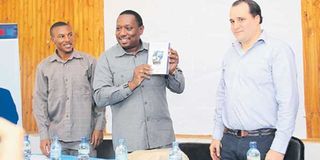Director: Don’t cry over delayed donor funding

Iringa Urban District Commissioner Richard Kasesela displays a book on leadership and development. With him is KAS resident director Daniel El Noshokaty who presented the book recently in Dar es Salaam. PHOTO|COURTESY
What you need to know:
Speaking on the sidelines of a workshop in Dar es Salaam that discussed a ‘new economic order’ for Tanzania on Friday, Mr El-Noshokaty wondered why the government has repeatedly been complaining during parliamentary budget sessions in the National Assembly that pledged donor funds have not been disbursed in the set timeframe.
Dar es Salaam. The resident director of the German non-foundation Konrad Adenaur Stiftung (KAS), Mr Daniel El-Noshokaty, has criticised the government’s repeated complaints that donor funds have not been forthcoming in full and at the right time – and there are some unfulfilled budget commitments.
Speaking on the sidelines of a workshop in Dar es Salaam that discussed a ‘new economic order’ for Tanzania on Friday, Mr El-Noshokaty wondered why the government has repeatedly been complaining during parliamentary budget sessions in the National Assembly that pledged donor funds have not been disbursed in the set timeframe.
“I think there is a real need for the government to set realistic budgets. After all, the promised funds from donors are just budgetary support,” said the KAS official who was answering questions from BusinessWeek.
For three consecutive years the Finance minister of the day has been complaining in the National Assembly during the tabling of budget proposals for debate that donor commitments to help fill gaps in the budget have been declining – and that, in most cases, there have delays in disbursing pledged funds.
According to the FY-2015/16 government budget report, the government had targeted to collect Sh2.9 trillion from donors for the 2014/15 financial year budget… But, up until April 2015, it had received only Sh408 billion, which was 44 per cent of the pledged amount of Sh922 billion in total.
“Grants and concessional loans were expected to amount to 70 per cent of the annual targets by June 30, 2015. The annual targets are not expected to be met due to the slow implementation of development projects – and failure of some development partners to fulfill their commitments,” reads part of the FY-2015/16 budget report.
Likewise, according to the FY-2016/17 budget report, the finance Minister of the day, Dr Philip Mpango, pointed out that, under the FY-2015/16 budget implementation, the government targeted to collect a total of Sh22.4 trillion in revenues, out of which donors pledged to contribute Sh2.3 trillion. But, up and until April 2016, the received funds amounted to Sh1.5 trillion: 65 per cent of the estimates. Ditto for FY-2017/18, whose budget speech in the august House by the same minister revealed that the government planned to collect Sh3.2 trillion in the 2016/17 financial year from donors towards an estimated budget of Sh29.5 trillion. But it had collected only Sh2.6 trillion from them up to April 2016.
“Disbursement of grants and external concessional loans were Sh2,340 billion, equivalent to 65.0 per cent of the annual development partners (DPs) commitments in Sh3,600.8 billion for2016/17 budget,” reads part of the minister’s budget speed of the current financial year.
During the workshop organized jointly by KAS and the Civic Education Teachers Association, a senior business law lecturer based at St Augustine University, Reverend Charles Kitima said that the FY-2017/18 budget implementation still left gaps that made it unrealistic – especially in its failure to strengthen the private sector.
“The budget has not contributed much to industrialization nor to the creation of middle-income citizens. Smallholder farmers who have been banned from exporting the commodities they themselves produce are suffering a lot from a high poverty incidence,” said Dr Kitima.
The KAS project manager in Tanzania, Dr Stephanie Brinkel, was of the view that, for the national budget to contribute positively to increased economic welfare for many people, it should depend more on local resources.
Dr Brinkel counseled that Tanzania must institute an economic model that would bring about positive effects on the people through appropriately formulated national budgets.




